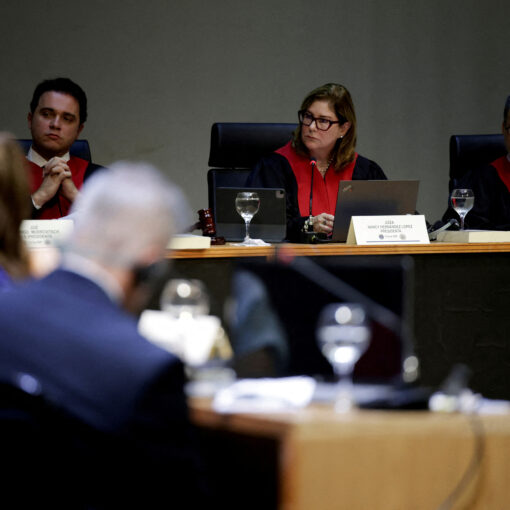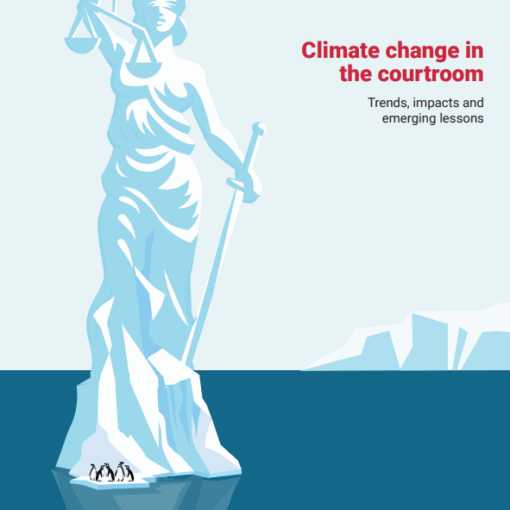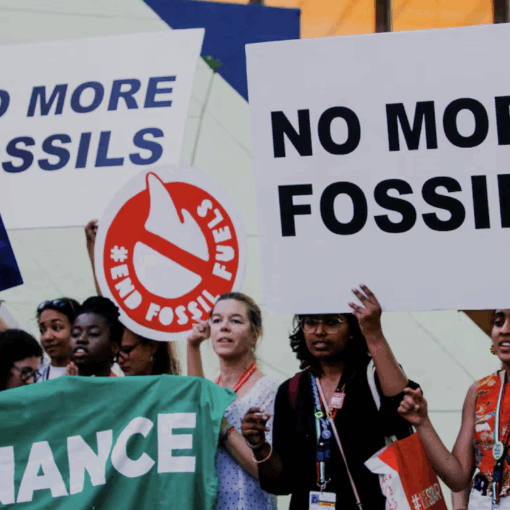 Each month, Arnold & Porter and the Sabin Center for Climate Change Law collect and summarize developments in climate-related litigation, which we also add to our U.S. and non-U.S. climate litigation charts. If you know of any cases we have missed, please email us at columbiaclimate at gmail dot com.
Each month, Arnold & Porter and the Sabin Center for Climate Change Law collect and summarize developments in climate-related litigation, which we also add to our U.S. and non-U.S. climate litigation charts. If you know of any cases we have missed, please email us at columbiaclimate at gmail dot com.
Here are the additions to the Climate Case Chart since Update #70.
FEATURED DECISION
Federal Court Rejected Plaintiffs’ Standing Arguments in Challenge to Ex-Im Bank Loan Guarantee for Coal Company
The federal district court for the District of Columbia ruled that environmental groups did not have associational or organizational standing to challenge a loan guarantee by the Export-Import Bank of the United States (Ex-Im Bank) to Xcoal Energy & Resources, LLC (Xcoal). The environmental groups contended that the $90-million loan guarantee facilitated export of $1 billion in U.S. coal, and that Ex-Im Bank had failed to comply with the requirements of the National Environmental Policy Act. The court ruled that the environmental groups asserting associational standing had failed to establish the redressability component of standing because they had not established a likelihood that a change in Ex-Im Bank’s authorization of the loan guarantee would affect Xcoal’s export of coal. Noting that, in a case like this one, the agency’s action is “only one piece of the redressability puzzle,” the court found that a declaration submitted by Xcoal’s vice president of finance supported the defendants’ assertion that Xcoal had obtained enough alternative sources of credit so that rescission of the loan guarantee would not impede coal exports; the court further found that the environmental groups had not brought forward any facts to rebut this testimony. The court also held that two other environmental groups—Pacific Environment (PE) and the Center for International Environmental Law (CIEL) —failed to establish organizational standing. The two groups had asserted that Ex-Im Bank’s actions caused injuries to their missions, activities, and resources. The court found that neither group had established injury-in-fact. The court found that PE had not established either a conflict between approval of the loan guarantee and PE’s mission, an impediment to the PE’s activities, or a drain on PE’s resources. With respect to CIEL, the court was not persuaded by arguments that CIEL’s policy work had been undermined because CIEL was forced to direct time and resources towards monitoring Ex-Im Bank’s policies, or that CIEL’s public education efforts had been injured by its inability to provide input during the course of Ex-Im Bank’s decision-making process. Chesapeake Climate Action Network v. Export-Import Bank of the United States, No. 13-cv-1820 (D.D.C. Jan. 21, 2015): added to the “Stop Government Action/NEPA” slide.
DECISIONS AND SETTLEMENTS
Federal Court Criticized NJDEP’s Condemnation Practices for Dune Project, But Denied Injunction
The federal district court for the District of New Jersey denied without prejudice a New Jersey city’s motion for a preliminary injunction to stop the U.S. Army Corps of Engineers (Corps) and the New Jersey Department of Environmental Protection (NJDEP) from constructing a dune system designed to protect the coastline during future storms. The court found that plaintiffs had shown a likelihood of success on the merits on the issue of whether NJDEP deprived them of procedural due process rights. The court described NJDEP’s decision to proceed with condemnation for the dune project through administrative orders rather than through the Eminent Domain Act’s procedures as “baffling.” The court determined, however, that the awarding of a contract by the Corps would not cause irreparable harm because actual construction would not begin until after NJDEP commenced a condemnation proceeding, which it had agreed to do by April 2015. Nor did the balance of harms or the public interest weigh in favor of an injunction. However, in the event the Corps is prepared to begin construction before the condemnation proceeding is filed, the court said plaintiffs could seek reconsideration. Margate City, New Jersey v. United States Army Corps of Engineers, No. 1:14-cv-07303 (D.N.J. Jan. 15, 2015): added to the “Adaptation” slide.
Federal Court Ruled for NSA in Action That Sought EPA Officials’ Phone, Text Message, and E-Mail Records
The federal district court for the District of Columbia rejected the Competitive Enterprise Institute’s (CEI’s) “novel and inventive gambit” to obtain information about EPA officials’ phone calls, e-mails, and text messages from the National Security Agency (NSA). CEI sought this information under the Freedom of Information Act (FOIA) as part of its broader effort to show that EPA officials had improperly been using private accounts to conduct their work. In response to CEI’s request, the NSA issued a Glomar response refusing to confirm or deny that it possessed relevant records. The court disagreed with CEI’s contention that NSA had waived its right to issue a Glomar response because it had publicly admitted (after the release of the Edward Snowden documents) that NSA collected this type of information. The court agreed with the NSA that there had been no official acknowledgment that the NSA had the specific records sought by CEI. Nor did public knowledge of the “general contours” of the NSA’s data collecting “vitiate” the Glomar response in this case. Competitive Enterprise Institute v. National Security Agency, No. 14-975 (D.D.C. Jan. 13, 2015): added to the “Force Government to Act/Other Statutes” slide.
Federal Court Approved Settlement of Alleged Greenhouse Gas Emissions Violations by Car Makers
The federal district court for the District of Columbia approved the record-setting Clean Air Act settlement negotiated by EPA, the California Air Resources Board (CARB), and Hyundai Motor Company, Kia Motors Corporation, and two other entities affiliated with the car manufacturers. The U.S. and CARB had alleged that the manufacturers falsified fuel economy and greenhouse gas emissions claims for more than one million vehicles for model years 2012 and 2013. The consent decree requires the companies to pay a $100-million fine, to forfeit 4.75 million tradeable greenhouse gas credits, and to take actions to ensure future conformance with the Clean Air Act’s requirements. The court called the settlement fair and said that the size of the fine—the largest in Clean Air Act history—and other provisions were adequate and appropriate. The court noted that five commenters (two environmental groups and three state environmental agencies or state attorneys general) had submitted comments supporting the settlement but asking that it be renegotiated to include $25 million for Supplemental Environmental Projects (SEPs) to support the promotion of electric vehicles in certain states. The court called the SEP proposal “laudable,” but it agreed with the U.S. that the public interest would not be served by reopening negotiations to create “a different and more complex settlement arrangement.” United States v. Hyundai Motor Co., No. 14-cv-1837 (D.D.C. Jan. 9, 2015): added to the “Regulate Private Conduct” slide.
California Appellate Court Upheld Environmental Review for Santa Clarita Development, Reversing Trial Court
The California Court of Appeal reversed a trial court decision that concluded that certain aspects of the environmental review for a 185-acre real estate development in the City of Santa Clarita were inadequate. The appellate court’s option did not substantively address the consideration of climate change in the environmental impact report (EIR) for the project, but, as a procedural matter, the court found that an alternative fuels plan had been properly incorporated by reference into the EIR section on global climate change. Santa Clarita Organization for Planning and the Environment v. City of Santa Clarita, No. B250487 (Cal. Ct. App. Dec. 18, 2014): added to the “State NEPAs” slide.
Federal Court Found That Agency Adequately Assessed Impacts of Climate Change on Loggerhead Sea Turtles
The federal district court for the District of Columbia rejected a challenge to the National Marine Fisheries Service’s (NMFS’s) issuance of a Biological Opinion determining that the Atlantic Sea Scallop Fishery would not jeopardize the survival of the Northwest Atlantic distinct population segment of loggerhead sea turtles. The court was not persuaded by the plaintiff’s claims that the no-jeopardy determination was arbitrary and capricious. The court rejected the argument that NMFS had not sufficiently considered the effects of climate change, finding that the plaintiff had failed to refute NMFS’s determination that current scientific data were too inconclusive to accurately predict impacts on loggerheads. The court distinguished earlier successful challenges of Biological Opinions where there were “wholesale failures to even address the issue” of climate change. Oceana, Inc. v. Pritzker, No. 08-cv-1881 (D.D.C. Dec. 17, 2014): added to the “Stop Government Action/Other Statutes” slide.
NEW CASES, MOTIONS, AND NOTICES
Oil and Gas Industry Challenged EPA’s 2014 Revisions to Greenhouse Gas Reporting Rule
The American Petroleum Institute and the Gas Processors Association each filed a petition in the D.C. Circuit Court of Appeals seeking review of EPA’s 2014 revisions to the greenhouse gas reporting rule. The revisions made changes to the reporting requirements and confidentiality determinations for the petroleum and natural gas systems source category. Among criticisms leveled at the revised rule during the public comment period were (1) that the removal of the best available monitoring methods (BAMM) option would make compliance difficult for some reporters and could have adverse impacts in other areas, such as the development of new technologies, and (2) that the revised rule increased the reporting burden for gas well completions and workovers by requiring reporters to differentiate between well type combinations. (“Well type combination” takes into account the following factors: vertical or horizontal, with flaring or without flaring, and reduced emissions completion (REC)/workover or no REC/workover.) Commenters also asserted that in general EPA had “significantly oversimplified the impacts and underestimated the burden” of the rule. American Petroleum Institute v. EPA, No. 15-1020 (D.C. Cir., filed Jan. 23, 2015); Gas Processors Association v. EPA, No. 15-1021 (D.C. Cir., filed Jan. 23, 2015): added to “Challenges to Federal Action” slide.
Biodiesel Company Challenged Delay of 2014 Renewable Fuel Standards in D.C. Circuit
A company that supplies a 100%-jatropha-plant-oil fuel for certain diesel engines filed a petition in the D.C. Circuit Court of Appeals to challenge EPA’s announcement that it would not finalize the 2014 applicable percentage standards for the Renewable Fuel Standard (RFS) program until 2015. EPA published notification of its decision to delay issuance of the standards in the December 9, 2014 issue of the Federal Register. The petitioner—Plant Oil Powered Diesel Fuel Systems, Inc.—said that EPA’s notification constituted agency action adopting the 2014 RFS standards proposed in November 2013. Plant Oil Powered Diesel Fuel Systems, Inc. v. EPA, No. 15-1011 (D.C. Cir., filed Jan. 15, 2015): added to the “Challenges to Federal Action” slide.
Environmental Groups and Others Asked FERC to Rescind Approvals for Pennsylvania-to-New York Gas Pipeline
Five requests for rehearing were filed with the Federal Energy Regulatory Commission (FERC) seeking rescission of its approval of a 124-mile gas pipeline between Pennsylvania and New York. The requests for rehearing charged that FERC committed a number of errors in its review of the pipeline, including failures to fully consider the project’s environmental impacts. For example, Catskill Mountainkeeper and other organizations charged that the environmental review should have considered the indirect impacts of additional gas production and that it had not fully considered the project’s greenhouse gas emissions. Among the alleged insufficiencies related to the project’s greenhouse gas emissions were failure to consider cumulative impacts, failure to consider the impact of the elimination of carbon sinks such as forests and wetlands, and failure to properly incorporate the social cost of carbon into the impact analysis. Catskill Mountainkeeper also accused FERC of improperly minimizing the significance of the project’s greenhouse gas emissions by comparing them to global emissions. Concern regarding the assessment of greenhouse gas emissions was echoed in other requests for rehearing, including it the request submitted by Stop the Pipeline, which took issue with the project sponsor’s assertion that natural gas would reduce greenhouse gas emissions. In re Constitution Pipeline Co., LLC, Docket Nos. CP13-499, CP13-502 (FERC, requests for reh’g (Catskill Mountainkeeper et al., Henry S. Kernan Trust, Stop the Pipeline, Allegheny Defense Project & Damascus Citizens for Sustainability, Capital Region Board of Cooperative Educational Services) filed Jan. 2, 2015): added to the “Stop Government Action/NEPA” slide.
Here are recent additions to the Non-U.S. Climate Litigation Chart.
In United Kingdom, Court upholds permit to built a wind turbine generator near heritage assets. A local planning authority in England denied an application to construct one wind turbine generator that would negatively affect nearby heritage assets. The applicant appealed, and the Planning Inspector reversed the local authority’s decision on the basis that “the benefits of the scheme, including the public benefits to be derived from tackling climate change out weigh the limited harm to the character and appearance of the area.” The claimant appealed to the High Court of Justice Planning Court, which affirmed the judgment of the Planning Inspector, finding that the Inspector had adequately explained his reasoning and that he was entitled to place “considerable value” on the climate change benefits of the scheme. Pugh v. Secretary of State for Communities and Local Government (United Kingdom, High Court of Justice Queen Bench Division Planning Court [2015] EWHC 3 – Added to “Renewable Projects” slide.




